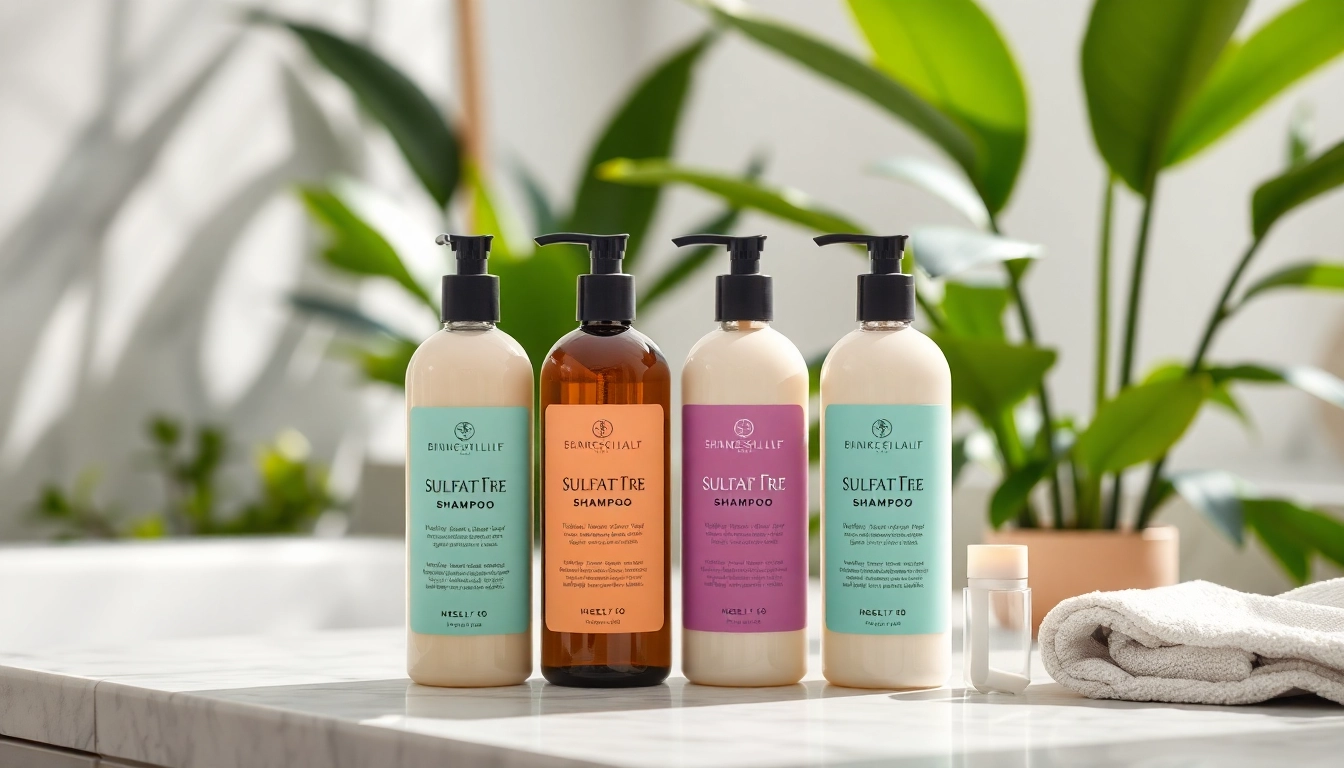Understanding Sulfate Free Shampoo
What Are Sulfates and Their Impact on Hair?
Sulfates are a category of chemicals commonly found in many personal care products, particularly shampoos. They serve as surfactants, which means they help in breaking down surface tension and enable water to mix with oil and dirt, aiding in their removal. The most common sulfates you might encounter in shampoos are sodium lauryl sulfate (SLS) and sodium laureth sulfate (SLES). While effective in cleaning, these sulfates can strip the hair of its natural oils, leading to dryness, irritation, and potential scalp issues.
Moreover, sulfates can cause color-treated hair to fade faster, compromising the vibrancy of your hair color. Many individuals with sensitive skin or specific scalp conditions may experience irritation from sulfate-infused formulas, leading to discomfort and further complications. Therefore, understanding the effects of sulfates on hair health is crucial when choosing the right hair care products. Due to these concerns, many have turned to sulfate free shampoo options to mitigate these issues.
Benefits of Using Sulfate Free Shampoo
Switching to sulfate free shampoos can offer a multitude of benefits for your hair and scalp. One primary advantage is the preservation of natural oils. Hair has its natural oils which play a crucial role in maintaining moisture and shine. Sulfate free shampoos gently cleanse without stripping these vital oils, promoting healthier and more manageable hair.
Additionally, sulfate free formulas are generally milder, making them suitable for all hair types, including curly, colored, or chemically treated hair. Users frequently report a reduction in frizz and an increase in shine after switching to sulfate free options. Importantly, those with sensitive scalps often find sulfate free products to be less irritating, resulting in a more comfortable cleansing experience.
Key Ingredients to Look For
When choosing a sulfate free shampoo, it’s beneficial to look for shampoos that contain nourishing and hydrating ingredients. Ingredients like coconut oil, aloe vera, and shea butter are excellent options that provide moisture and help maintain hair health. Tea tree oil is also noteworthy for its soothing properties, particularly beneficial for those with scalp issues.
Other elements such as hydrolyzed silk proteins can assist in hair repair and strength, while botanical extracts can offer moisturizing and antioxidant benefits. By focusing on the ingredient list, you can ensure you choose a shampoo that not only cleans your hair but also supports its long-term health.
Choosing the Right Sulfate Free Shampoo
Identifying Your Hair Type and Needs
Effective hair care starts with understanding your unique hair type and its specific needs. Different hair types—from straight to wavy to curly—require different formulations. For example, fine hair often benefits from volumizing sulfate free shampoos that don’t weigh it down, whereas thick or curly hair may need a richer, more moisturizing formulation. Those with oily hair may look for balancing shampoos, while dry hair types will benefit from those focused on hydration.
Identifying the existing issues you face with your hair can also guide your purchase. If you struggle with dandruff, select formulations designed for scalp health. If your hair is color-treated, look for shampoos specifically formulated to preserve color. Tailoring your choice to your precise needs ensures you choose a product that truly complements your hair.
How to Read Shampoo Labels Effectively
Understanding how to read product labels is invaluable in selecting the right sulfate free shampoo. Start by scanning for the sulfate-free certification—this ensures you’re choosing a product that aligns with your hair care goals. Next, examine the ingredient list for quality components. Look for natural oils, vitamins, and botanical extracts that can enhance hair health.
Beware of products labeled “gentle” or “sulfate-free” without a clear ingredient list. Often, they may contain other harsh ingredients that can irritate the scalp or damage hair. Focus on transparency from brands that openly share their formulations.
Comparing Different Sulfate Free Shampoo Brands
With a myriad of brands offering sulfate free shampoo, comparing them can become a daunting task. Start by considering product reviews and recommendations from friends or beauty experts. Look into brand transparency and their ingredient sourcing practices, as these can influence overall product quality.
Price is another factor to consider; however, remember that higher cost does not always equate to better quality. Invest time in reading comparisons on effectiveness, scent, and how hair feels after prolonged use. Many brands provide trial sizes—this can be an excellent opportunity to test before making a full purchase.
How to Use Sulfate Free Shampoo Effectively
Best Practices for Application
Using sulfate free shampoo effectively goes beyond just applying it to wet hair. Begin by wetting your hair thoroughly; this helps the shampoo spread more easily. Take a small amount of shampoo—usually, a quarter-sized amount is sufficient—and lather it in your palms before applying it directly to your scalp.
Focus on massaging the scalp gently to stimulate blood circulation, which promotes healthy hair growth. Unlike traditional shampoos, sulfate free shampoos produce less lather, so you might be tempted to use more. Resist this urge; a smaller amount can be just as effective. Rinse thoroughly to ensure all product is removed, followed by a suitable conditioner for best results.
Pairing Shampoo with Sulfate Free Conditioners
The efficacy of a sulfate free shampoo is often amplified when paired with a complementary sulfate free conditioner. Choose a conditioner that addresses your hair’s specific needs—hydrating for dry hair, lightweight for oily hair, or smoothing for frizzy hair.
After shampooing, apply conditioner primarily to the lengths and ends of your hair, avoiding the scalp to prevent oiliness. Allow it to sit for a few minutes for maximum absorption before rinsing it out completely. This pairing not only enhances hair texture but also nourishes and protects it from damage.
Frequency of Use for Optimal Results
The frequency of shampooing with sulfate free products can vary depending on personal preferences and hair type. Generally, if your hair is prone to oiliness, shampooing every other day may be beneficial, while individuals with dry or curly hair may find washing their hair once or twice a week sufficient to maintain moisture.
Pay attention to your hair’s response; if it looks dull or feels dry, consider reducing wash frequency or trying a different product. The goal is to keep your hair clean without stripping it of essential oils, so develop a routine that suits both your lifestyle and hair health.
Common Misconceptions About Sulfate Free Shampoo
Myths vs. Facts
There are several myths surrounding sulfate free shampoos that can mislead consumers. A prevalent myth is that sulfate free shampoos do not cleanse hair effectively. This is untrue; while they may not lather as much, they can cleanse hair effectively by utilizing gentle surfactants that don’t compromise hair health.
Another common misconception is that sulfate free shampoos are only for people with sensitive skin or specific scalp conditions. In reality, anyone can benefit from sulfate free formulations, as they promote overall hair health and maintain natural moisture levels.
Do Sulfate Free Products Clean as Well?
One of the most debated questions is whether sulfate free shampoos clean hair as well as traditional shampoos. The answer largely depends on individual hair types and the specific shampoo used. Though they may produce less lather, sulfate free shampoos can still be effective in removing dirt and excess oil when applied correctly. Evaluating individual needs allows for selecting the best-suited product that offers optimal cleansing without adverse effects.
Long-Term Hair Health Benefits
Using sulfate free shampoo can contribute to long-term benefits for hair health. By avoiding harsh sulfates, you promote hair hydration, reducing the chances of damage or irritation. Over time, this leads to a stronger hair structure, improved elasticity, and reduced breakage, benefiting your hair’s appearance and texture.
Additionally, sulfate free options often contain nurturing ingredients that nourish hair follicles from root to tip, leading to enhanced shine and vibrancy. Commitment to sulfate free hair care can transform the health of your hair over time, making it a worthwhile investment for anyone looking for luxurious and manageable locks.
Sulfate Free Shampoo for Various Hair Concerns
For Color-Treated Hair
Color-treated hair requires special care to maintain its vibrancy and integrity. Sulfate free shampoos designed for colored hair help preserve color by reducing fading and preventing excess dryness. These formulations often include protective antioxidants that shield hair from environmental stresses.
When choosing shampoo for color-treated hair, look for moisturizing ingredients, which can help maintain the health of the hair while enhancing luminosity and color vibrancy. Regular use of a sulfate free shampoo tailored for colored hair can extend the life of your hair color and enhance its overall appearance.
For Curly and Textured Hair
Curly and textured hair presents unique challenges, particularly in maintaining moisture and preventing frizz. Sulfate free shampoos can be particularly beneficial for curly hair, as they cleanse without stripping away natural oils essential for curl definition and moisture retention. Look for shampoos that contain hydrating ingredients such as glycerin, argan oil, or jojoba oil.
Additionally, incorporating a defining curl cream or moisturizer after shampooing can further enhance curl pattern while combating dryness. Adopting a sulfate free hair care regimen tailored for textured hair can dramatically improve manageability and overall hair health
For Sensitive Scalps
Individuals with sensitive scalps often struggle with irritation and discomfort caused by harsh shampoos. Sulfate free shampoos offer a gentle cleansing alternative that can help soothe the scalp while effectively removing product buildup. Look for products that contain botanical extracts known for their soothing properties, such as chamomile or calendula.
In addition, it’s advisable to avoid shampoos with synthetic fragrances or unnecessary additives that can exacerbate sensitivity. Regular use of a sulfate free shampoo formulated for sensitive scalps can provide relief while promoting healthier hair and scalp.



